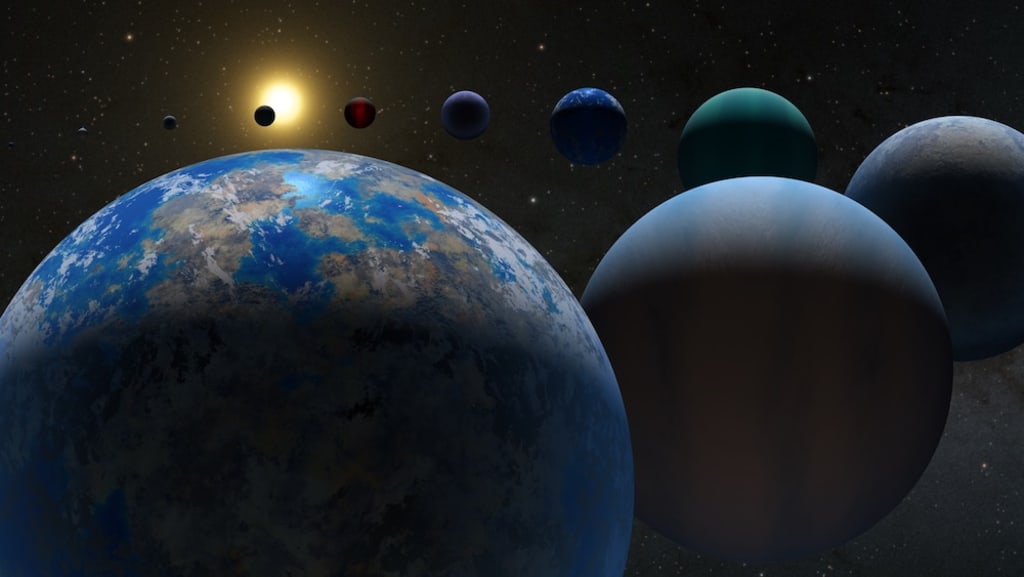Is there Life on Other Planets?
Exploring the Possibility of Extraterrestrial Life

The question of whether there is life on other planets has fascinated humanity for centuries. As our understanding of the universe and our ability to explore it has grown, the search for extraterrestrial life has become an increasingly active field of scientific research. While we have yet to definitively answer this question, there are several reasons to believe that life may indeed exist beyond Earth.
First, the sheer size of the universe suggests that the likelihood of Earth being the only planet capable of supporting life is incredibly low. The universe is estimated to contain more than 100 billion galaxies, each containing billions of stars. Many of these stars are believed to have planets orbiting them, and some of these planets may be in the so-called "habitable zone," where conditions are just right for liquid water and potentially life to exist.
In recent years, our ability to detect planets beyond our own solar system has grown significantly, thanks to advances in technology such as the Kepler space telescope and ground-based observatories. These discoveries have revealed that planets are actually quite common in the universe, and that many of them are Earth-sized and in the habitable zone of their host star.
Second, we know that life on Earth originated relatively quickly after the planet formed, suggesting that the ingredients for life may be common throughout the universe. Scientists believe that life on Earth emerged around 3.5 billion years ago, just a few hundred million years after the planet itself was formed. This suggests that life may be a natural and relatively common outcome of the conditions present on a rocky planet like Earth.
Moreover, we know that life on Earth has survived and thrived in some of the most extreme environments imaginable, from the deep sea vents to the polar regions. This has led scientists to consider the possibility that life may exist in similarly extreme environments on other planets, such as the subsurface oceans of icy moons like Europa and Enceladus.
Third, the discovery of microbial life on Mars would provide strong evidence that life is not unique to Earth. While Mars is not in the habitable zone of our solar system, it may have had conditions that were suitable for life in the past. NASA's Mars 2020 mission, which landed the Perseverance rover on the Red Planet in February 2021, is designed to search for signs of past microbial life on Mars. If evidence of such life is found, it would be a major milestone in the search for extraterrestrial life.
While we cannot definitively say whether there is life on other planets, there are many reasons to believe that it may indeed exist. The sheer size of the universe, the abundance of planets, the early emergence of life on Earth, and the ability of life to survive in extreme environments all suggest that the possibility of extraterrestrial life is real. As our technology and understanding of the universe continue to advance, we may be one step closer to finding out if we are truly alone in the universe.
While there are reasons to believe that life may exist elsewhere in the universe, we must also acknowledge the possibility that we may not find any evidence of extraterrestrial life in our lifetime. The universe is vast, and the search for life beyond Earth is a complex and challenging endeavor.
Moreover, even if life does exist on other planets, it may be very different from the life we know on Earth. Life on other planets may have evolved in unique ways, adapted to different environments, and may be based on different chemical processes.
Despite these challenges, the search for extraterrestrial life continues to be an active field of scientific research. Scientists are developing new techniques for detecting signs of life on other planets, such as analyzing the chemical composition of exoplanet atmospheres and searching for biosignatures – chemical indicators of life.
In addition to searching for microbial life on Mars and other planets in our solar system, scientists are also studying the potential habitability of exoplanets. The upcoming James Webb Space Telescope, set to launch in 2021, is expected to revolutionize our understanding of exoplanets, and may provide new insights into the potential for life beyond our solar system.
While the search for extraterrestrial life remains a challenging and complex endeavor, there are compelling reasons to believe that life may exist on other planets. As our technology and understanding of the universe continue to advance, we may be one step closer to finding out if we are truly alone in the universe. The search for extraterrestrial life is not only a scientific question, but also a philosophical and existential one, with profound implications for our place in the universe and our understanding of life itself.
The discovery of extraterrestrial life would have profound implications for our understanding of the universe and our place in it. It would fundamentally alter our perspective on what it means to be alive and could provide new insights into the origins and evolution of life on Earth and beyond.
The discovery of intelligent extraterrestrial life would also raise profound questions about our place in the cosmos and our relationship to other intelligent beings. It could have profound philosophical, religious, and societal implications, and could potentially lead to a new era of scientific and cultural exchange between different civilizations.
However, the discovery of extraterrestrial life could also pose new challenges and risks, particularly if we were to make contact with intelligent beings from other planets. It could potentially lead to new conflicts and challenges for our civilization, and could require new ethical and moral frameworks for how we interact with other intelligent beings.
As we continue to search for extraterrestrial life, it is important to approach this question with an open mind and a sense of wonder and curiosity. The search for life beyond Earth is not only a scientific question but also a cultural and philosophical one, with far-reaching implications for our understanding of the universe and our place in it.
In conclusion, while the question of whether there is life on other planets remains unanswered, the search for extraterrestrial life continues to be an active and exciting field of scientific research. Whether we ultimately find evidence of life beyond Earth or not, the search itself is a testament to our curiosity and our desire to understand the universe and our place within it.
About the Creator
DRD
a asted life
Enjoyed the story? Support the Creator.
Subscribe for free to receive all their stories in your feed. You could also pledge your support or give them a one-off tip, letting them know you appreciate their work.






Comments
There are no comments for this story
Be the first to respond and start the conversation.